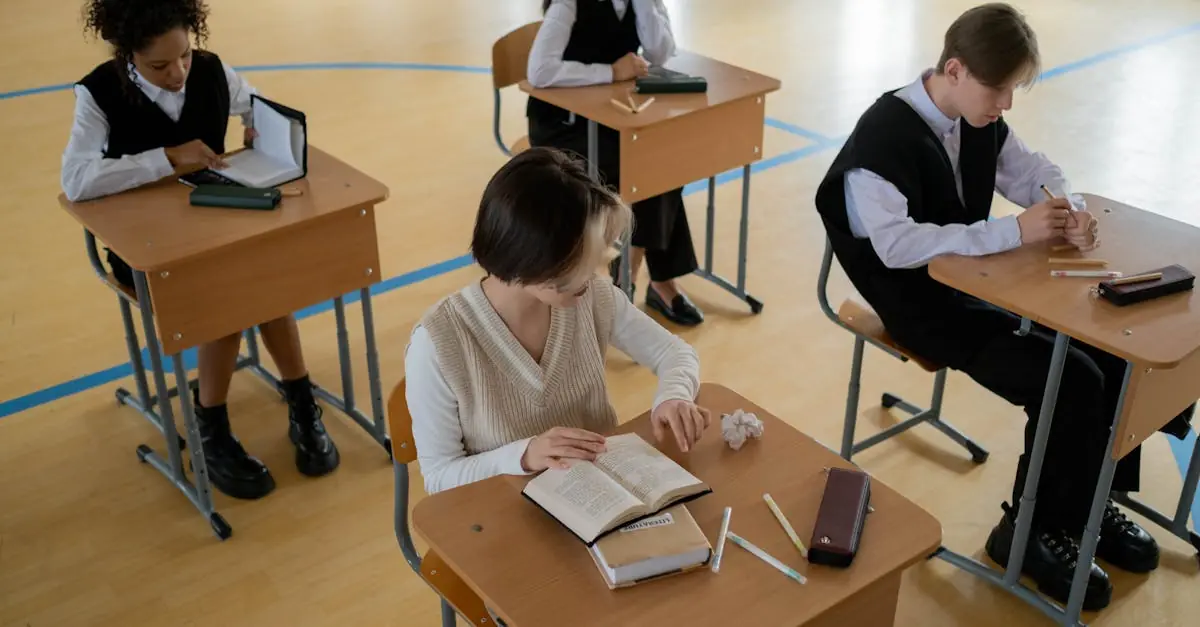When we think about education, private schools often pop up as the luxurious option, akin to the filet mignon of educational choices. But before we jump into the vaults of knowledge that these institutions claim to hold, let’s admit it: sending your child to a private school isn’t just about academic excellence: it’s a financial leap of faith, a lifestyle choice, and sometimes, a ticket to the elite status club. So, buckle up as we embark on this journey into the world of private education. We promise no boring lectures here, just a sprinkle of humor and plenty of insights.
Table of Contents
ToggleWhat Is a Private School?
Private schools, unlike public institutions funded by the government, operate independently. This independence allows them to carry out their own curriculum, set their own fees, and often take a more personalized approach to education. Imagine a school where the principal doesn’t have to check with the district board before changing the cafeteria menu, sounds dreamy, right?
In a nutshell, private schools are funded through tuition fees, donations, and sometimes, endowments. This financial structure empowers them to offer specialized programs and smaller class sizes, which many parents see as a significant advantage for their children’s education.
Types of Private Schools
Diversity is the spice of life, and the same holds true in the private school sector. Here are a few common types we can explore together:
Independent Schools
These are self-governing institutions that don’t have ties to any religious organization. They often boast a robust college preparatory curriculum.
Religious Schools
As the name suggests, these schools incorporate religious teachings into their curriculum. You’ll often find Catholic, Jewish, Islamic, or other faith-based institutions here.
Montessori Schools
We’ve all heard about the Montessori method, right? These schools focus on child-led learning, encouraging kids to explore at their own pace. It’s like letting a child loose in a candy store, pure joy and a little chaos.
Special Education Schools
Tailored for students with disabilities or learning difficulties, these schools focus on meeting individual needs. They aim to provide a supportive and adaptive learning environment.
Each type offers unique approaches and values, ensuring parents can find an option that aligns with their educational philosophy.
Benefits of Attending a Private School
Curious about why some parents choose private education? Let’s break down the perks:
- Smaller Class Sizes: With fewer students, teachers can focus on individualized attention. That’s fantastic for parents who want their little scholars to get the help they need.
- Special Programs: Private schools often offer unique programs, be it advanced courses in the sciences, the arts, or extracurricular activities that might not be available in public schools. Who wouldn’t want their child to learn the violin while mastering calculus?
- Resource Availability: Many private institutions have access to resources that enhance classroom learning: libraries, technology labs, and sports facilities Galore.
- Community and Networking: The relationships built in private schools often extend beyond the classroom. Networking opportunities can be invaluable for future internships and job prospects.
We can’t ignore these advantages, as they help shape our kids into well-rounded individuals.
Considerations When Choosing a Private School
Choosing the perfect private school is akin to choosing a home, it requires careful thought and consideration. Here are some factors we should keep in mind:
- Location: Proximity to home can significantly impact daily logistics, especially for busy families.
- Curriculum and Philosophy: Understanding the school’s educational philosophy is crucial. Does it align with our values and educational goals for our children?
- Diversity and Inclusivity: Learning in a diverse environment can enrich our children’s experiences and broaden their perspectives.
- Reputation and Reviews: Talking to other parents and researching school reviews can shed light on the school’s strengths and weaknesses.
- Financial Considerations: We always need to weigh the cost of tuition against the value of the education. Scholarships or financial aid might be an option worth exploring.
Cost of Private School Education
Let’s talk dollars and cents, shall we? The average cost of private school tuition varies dramatically, depending on the school and location. According to recent data, parents can expect to shell out anywhere from $5,000 to over $50,000 annually. Yes, you read that correctly.
When calculating the real cost, we also need to consider additional expenses, such as uniforms, school supplies, and sometimes, even fees for activities or events. It’s wise to budget for these potential costs to avoid any financial surprises. Scholarships or financial aid programs can ease the burden and help ensure that quality education is accessible.




